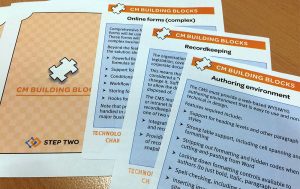Filed under: Content management
Organisations often make the selection of a CMS much harder than it needs to be. They do this by running into common pitfalls that impact not just on the selection process, but on the overall success of the CMS project.
Over the past ten years, we have worked with many organisations on content management systems, and have seen a huge number of tenders released to the marketplace. Across these projects, the same issues are seen again and again. These most often relate to how the requirements are documented, or how the overall tender is structured.
They may also arise from a lack of clear scope for the CMS project, or from the limited understanding of content management issues and the CMS marketplace. With the aim of tackling some of these issues, this article lists the top ten mistakes commonly seen when attempting to select a CMS.
At their heart, these are all simple issues to resolve, primarily by taking a common-sense approach to the selection process.
It is easy to get caught up in the detail of the requirements and the CMS project, losing sight of the overall objectives and process. The starting point is therefore to step back and to evaluate where the project is at, and how it will proceed.
By reviewing the project against the ‘top 10’ in this article, it should be possible to chart a rapid (but careful) path through the selection process, to the final deployment of a CMS that works well for authors, site administrators and the wider organisation.
1. Not understanding the problem to be solved
All too often, organisations rush into purchasing a new piece of technology before fully understanding the problem to be solved. For example, CMS selection may unfortunately be done before:
- determining the business needs and overall business goals
- identifying the underlying website design or management issues
- creating an overall website or intranet strategy
- identifying what functionality will be delivered by the site (rather than the CMS)
- choosing which sites will be in scope for the CMS project
[December KM Column, read the full article]




